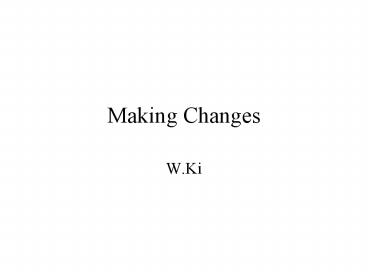Making Changes PowerPoint PPT Presentation
Title: Making Changes
1
Making Changes
- W.Ki
2
Concern Theory of ChangeHall, G.E. Hord,S.M.
(1987) Change in Schools.
- What is the concept of Concerns?
- What are the proposed general stages of concern?
- Do they match you experience?
- Does it offer any inspiration about how you can
facilitate change? - What differences does it make in seeing with this
theory? - strengths?
- weakness?
3
Change Forces The SequelMicheal Fullan (1999)
- Vision and strategic planning, not wrong, but
contributing to superficial thinking - concept of moral purpose is not straightforward
- Breakthroughs occur when we begin to think of
conflict, diversity and resistance as positive
and essential forces for success - Need to unpack the problem of transferability
4
Moral purpose in complex times
- Dynamics of diversity, equity, power
- Empathy elicits altruistic motives
- Difficult to have empathy to those so different
- Conflict of interest and difference in power
- fast changing environments
- Rationally constructed reform strategies do not
work - The real management task is that of coping with
and even using - unpredictability, clashing counter-cultures,
discensus, contention, conflict and
inconsistency. - The concept complex systems
5
Complexity Theory
- Webs of nonlinear feedback loops
- States of stable and unstable equilibration
- All organizations are paradoxes
- Stability? ossified Instable? disintegrate
- Success lies in the borders
- Dynamics of successful organizations involves
irregular cycles and discontinuous trends,
unknown specific futures
6
- Agents within the system can do ideological
control only for short terms - Long term development emerge from spontaneous
self-organization political interaction,
learning - Through which managers create and discover their
environments and the long-term futures of the
organization - Complex adaptive systems consist of a number of
components that interact with each other
according to sets of rules - that require them to examine and respond to each
others behavior in order to improve their
behavior and thus the behavior of the system they
comprise.
7
- Adaptation is most effective in systems that are
only partially connected - to stay poised on this edge of chaos.
8
Evolution Theory
- Cooperative groups thrive and selfish ones do
not, so cooperative societies have survived at
the expense of others. - When ideas, knowledge, practices, beliefs, can be
passed from person to person - The titmouse and robin story
- titmouse flocks robins territorial
- Narrower economic income distribution and better
social cohesion - Have to be a combination of political, moral, and
self-interested forces
9
New theory of movementThe analogy of recreating
a prairie
- A prairie is something that grows. It has to
start small. It has pieces that interact and
build on each other. Once it is up and running
the prairie works as a complex system that is
dependent on the interaction of the system. - Evolutionary and ecological way of seeing
10
- They forget that their organisations true
nature is that of community of humans - The knowledge expressed in words and numbers
represents only the tip of the iceberg. - Knowledge as being primarily tacit, highly
personal and hard to formulize or express - However, the sharing of tacit knowledge among
multiple individuals with different background,
perspectives and motivations becomes the critical
step for organizational knowledge creation to
take place.
11
- You cant hire firm specific knowledge, you must
grow it - The problem of transferability of reform
- The new lessons for complex changes
- Can you guess what they mean?
- Do these make any sense to you?
- Do you think this is the popular way of
thinking? - Can you apply these ideas to your school?
12
Tunnel vision vs holistic thinking
- Larry Cuban (2001) Why are most teachers
infrequent and restrained users of computers in
their classrooms. In Technology, curriculum and
professional development. Edited by J.Woodward
And L. Cuban. - Brown,J.S. and Duguid,P. (2000) The Social Life
of Information. Harvard Business School Press

